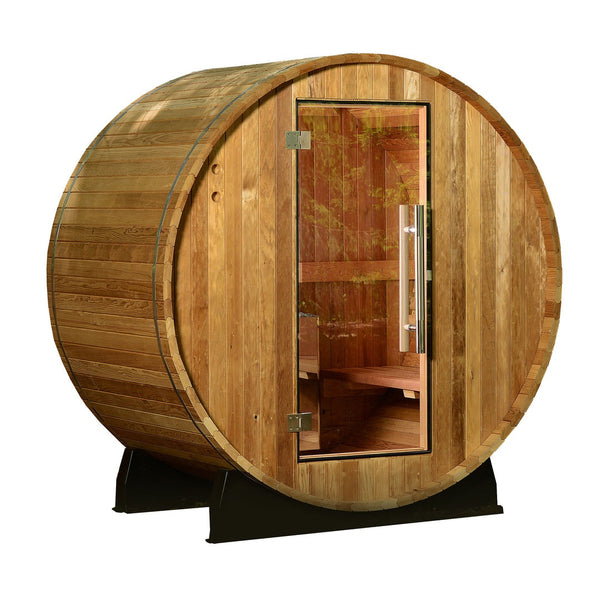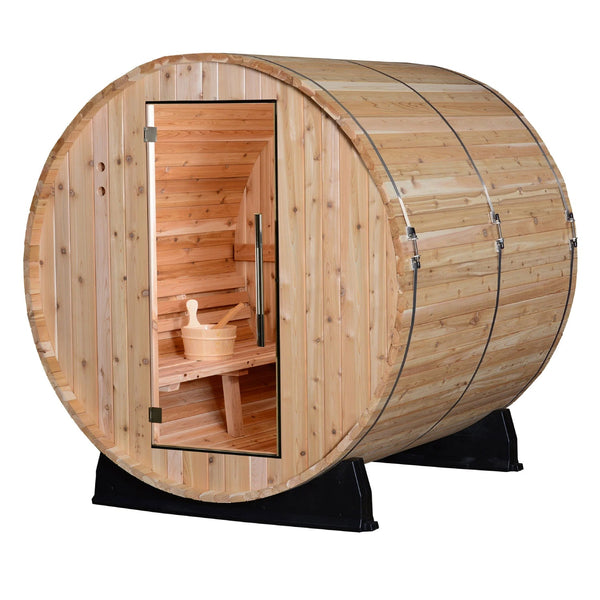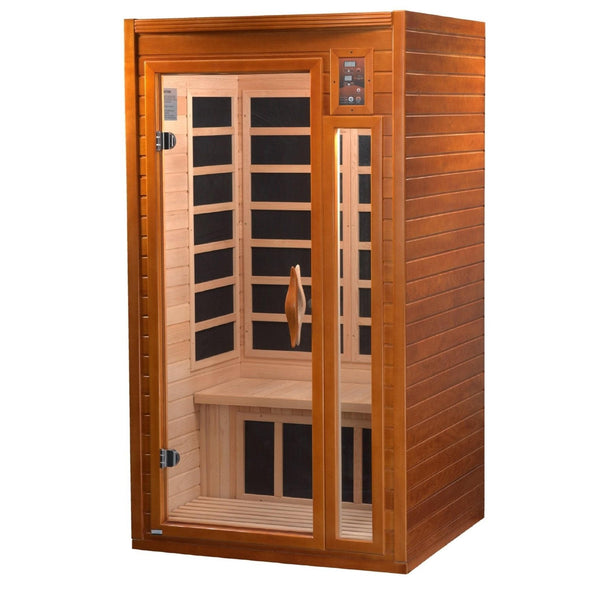
A sauna is essentially a small room or building designed to be heated to high temperatures, to promote sweating and relaxation. There are two main types of saunas: traditional saunas, which use wood, electricity, or gas to heat the air in the room, and infrared saunas, which use infrared lamps to warm the body directly.
Saunas have been used for centuries across various cultures, from the steam baths of the Romans to the sweat lodges of Native Americans, for their perceived health benefits. In modern times, saunas have become a common feature in many fitness centers, spas, and even homes, due to their potential to enhance both physical and mental health.
The use of a sauna can lead to various physical health benefits, including improved cardiovascular function, skin health, muscle recovery, and detoxification. These benefits are primarily attributed to the heat-induced increase in heart rate and sweating, which can enhance blood circulation, cleanse the skin, burn calories, relieve muscle tension, and eliminate toxins from the body.
In addition to the physical benefits, sauna use can also have positive effects on mental health. The heat and relaxation can help reduce stress and anxiety, improve mood, and promote better sleep. Some research even suggests that regular sauna use may be associated with a lower risk of mental health disorders.
Despite the potential benefits, sauna use is not without risks. It’s important to use saunas properly and safely, considering factors such as the temperature, duration, and frequency of use, as well as individual health conditions and needs.
This article offers a detailed guide on the benefits of sauna use for mental and physical health.
Differences Between Traditional Saunas and Infrared Saunas
Traditional saunas and infrared saunas are two popular types of saunas that are often used for relaxation and health benefits. While they both provide a warm environment for users, they differ in several key aspects, including their heating method, temperature range, and health benefits.
Heating Method
Traditional saunas, also known as Finnish saunas, use a stove to heat the air in the room. The stove can be electric, wood-fired, or gas. The heat from the stove warms the air, which in turn warms the body. Some traditional saunas also have rocks on the stove that can be splashed with water to create steam and increase the humidity in the room.
In contrast, infrared saunas use infrared heaters to emit infrared light, which is experienced as radiant heat. This radiant heat is absorbed directly by the skin, without warming the air in the room. Infrared saunas can be further divided into far-infrared saunas (FIR), which emit longer wavelength infrared light, and near-infrared saunas (NIR), which emit shorter-wavelength infrared light.
Temperature Range
Traditional saunas typically operate at a higher temperature than infrared saunas. The temperature in a traditional sauna can range from 176°F–212°F (80°C–100°C), with a humidity level of 10% to 20%.
Infrared saunas, on the other hand, operate at a lower temperature, typically between 113°F–140°F (45°C– 60°C). Because infrared saunas heat the body directly rather than heating the air, they can induce a similar level of sweat at a lower temperature.
Health Benefits
Traditional and infrared saunas both offer health benefits like relaxation, improved circulation, and detoxification, but they work differently and may suit different health goals.
Traditional saunas use higher temperatures and can increase humidity, which might boost cardiovascular health, ease arthritis symptoms, and strengthen immune function. Infrared saunas, heating the body directly, might penetrate deeper into the skin for better detoxification and potentially offer more benefits for conditions like chronic fatigue syndrome and rheumatoid arthritis.
The choice between them often depends on personal preference and specific health objectives. Always consult a healthcare provider before starting any new health regimen.
The Ideal Sauna Session Length
The duration of a sauna session can vary greatly depending on individual tolerance and the specific goals of the session. However, as a general guideline, most experts recommend staying in a sauna for around 15 to 20 minutes at a time.
The recommended duration for a sauna session is based on several factors:
- Heat Tolerance: The body’s tolerance to these temperatures can vary greatly from person to person. Some people may feel comfortable in a sauna for longer periods, while others may need to limit their sessions to avoid discomfort or health risks.
- Hydration Status: Saunas cause the body to sweat, which can lead to dehydration if not properly managed. It’s important to stay well-hydrated before, during, and after a sauna session. If you start to feel dizzy, lightheaded, or excessively thirsty, it’s a sign that you may be dehydrated and should leave the sauna.
- Health Goals: The duration of a sauna session can also depend on your specific health goals. For example, if you’re using a sauna for muscle recovery after a workout, you might stay in longer than if you’re using it for general relaxation and stress relief.
It’s important to note that staying in a sauna for too long can be harmful. As a beginner, it’s advisable to start with shorter sessions of around 5 to 10 minutes and gradually increase the duration as your body adapts to the heat.
Always listen to your body and never stay in a sauna longer than you feel comfortable.
The goal of a sauna session is to relax and improve health, not to push your body to its limits. It’s always better to err on the side of caution when it comes to sauna use.
Physical Health Benefits of Sauna Use

Saunas have been used for centuries for their numerous physical health benefits. The heat exposure in a sauna induces a deep sweat, which can lead to a variety of positive health effects.
- Cardiovascular Health: The heat causes the heart rate to increase, similar to the effect of moderate exercise. This can lead to improved circulation, lower blood pressure, and enhanced heart health.
- Immune System Boost: Heat exposure can stimulate the production of white blood cells, which play a crucial role in fighting off infections and diseases. Regular sauna users often report fewer instances of common illnesses like colds and flu.
- Respiratory Health: Sauna use can improve respiratory function. The warm, humid air can help to open up the airways, reduce congestion, and improve lung function. This can be particularly beneficial for individuals with respiratory conditions such as asthma or chronic bronchitis.
- Muscle Recovery: Saunas can aid in muscle recovery after workouts. The heat can help to relax the muscles and alleviate muscle pain. It can also increase blood flow to the muscles, which can speed up the recovery process and reduce the risk of injury.
- Skin Health: Deep sweating can help to cleanse the pores and remove dead skin cells, leading to healthier and more radiant skin. Sauna use can also improve skin conditions such as acne, eczema, and psoriasis.
- Detoxification: Saunas can aid in detoxification. Deep sweating can help to eliminate toxins from the body, including heavy metals and other harmful substances. This can lead to improved overall health and well-being.
- Weight Loss: While sauna use alone is not a comprehensive weight loss strategy, it can complement a balanced diet and regular exercise. The heat can increase the metabolic rate, leading to increased calorie burn. Additionally, deep sweating can help to reduce water weight and bloating.
Regular sauna use can offer a wide range of physical health benefits. However, it’s important to use saunas responsibly and consult with a healthcare provider if you have any pre-existing health conditions.
Benefits of Sauna Use for Post-Workout Muscle Recovery
Utilizing saunas has been associated with enhanced muscle recuperation post-exercise, contributing to its popularity among athletes and those keen on fitness. Dr. Ai Mukai notes that athletes employ sauna sessions to aid in enhancing their performance and stamina.
The heat exposure in a sauna can increase blood circulation, which in turn can help deliver more oxygen and nutrients to the muscles, aiding in their repair and recovery.
While sauna use can aid in muscle recovery, it’s important to note that it should not replace other recovery methods such as proper nutrition, hydration, and rest. It’s also recommended to wait at least 10–15 minutes after a workout before entering a sauna to allow the body to cool down.
Mental Health Benefits of Sauna Use

Sauna use has been linked to various mental health benefits, primarily due to its ability to induce relaxation and reduce stress. The heat from the sauna stimulates the release of endorphins, the body’s natural feel-good chemicals, which can promote a sense of well-being and happiness.
Regular sauna use offers a wide range of mental health benefits, notably featuring stress and anxiety reduction through lowering cortisol levels and enhancing relaxation by soothing muscles and the mind.
Additionally, the heat from the sauna encourages the release of endorphins, neurotransmitters responsible for feelings of happiness, thereby uplifting mood and fostering emotional well-being. It also plays a significant role in improving sleep quality by relaxing the body and mind, which is beneficial for those battling insomnia, ultimately having a positive effect on mental health.
Furthermore, sauna sessions may bolster cognitive functions by increasing blood flow to the brain and potentially reducing the risk of cognitive disorders.
While the mental health benefits of sauna use are promising, it’s important to note that sauna use should not replace traditional mental health treatments, but rather serve as a complementary therapy.
Always consult with a healthcare provider before starting any new treatment regimen for mental health conditions.
|
Fun Fact: In many cultures, sauna-going is a social event, which can provide significant mental health benefits. |
Guidelines for Sauna Use
Determining the frequency of sauna use for health benefits can depend on various factors, including individual health status, tolerance to heat, and specific health goals. However, several studies and expert recommendations can provide some general guidelines.
A study published in JAMA Internal Medicine found that Finnish men who used a sauna 4-7 times per week had a significantly lower risk of cardiovascular disease and all-cause mortality compared to those who used a sauna once a week. This suggests that frequent sauna use may have substantial health benefits.
However, it’s important to note that these findings are based on traditional Finnish saunas, which are typically hotter and drier than other types of saunas. Therefore, the results may not apply to other sauna types, such as infrared saunas or steam rooms.
For those new to sauna use, it may be beneficial to start with shorter, less frequent sessions and gradually increase the duration and frequency as tolerance develops. It’s also important to listen to your body and adjust your sauna use accordingly. If you feel dizzy, lightheaded, or uncomfortable at any point, it’s best to leave the sauna and cool down.
Certain conditions, such as low blood pressure, heart disease, or pregnancy, may require special precautions or contraindicate sauna use altogether.
Optimizing Sauna Use for Maximum Health Benefits

The best way to use a sauna for health benefits involves several steps before, during, and after the sauna session. These steps are designed to maximize the health benefits of sauna use and minimize any potential risks or side effects.
Before the Sauna Session
- Hydrate: Drink plenty of water before entering the sauna to prevent dehydration. The high temperatures in a sauna can cause significant sweating, which can lead to dehydration if not properly managed.
- Eat Lightly: Have a light meal or snack before the sauna session. Going into a sauna on an empty stomach can cause dizziness or fainting, but a heavy meal can interfere with the body’s ability to regulate temperature.
- Remove Jewelry: Metal objects can become hot in the sauna and cause burns. It’s best to remove all jewelry and other metal objects before entering the sauna.
During the Sauna Session
- Start Slow: If you’re new to sauna use, start with shorter sessions at lower temperatures and gradually increase the duration and temperature as your body adapts.
- Relax and Breathe: Use the sauna as a time to relax and de-stress. Deep, slow breathing can enhance the relaxation benefits of sauna use.
- Listen to Your Body: If you start to feel dizzy, nauseous, or uncomfortable in any way, it’s time to leave the sauna. It’s important to listen to your body and not push beyond your comfort level.
After the Sauna Session
- Cool Down Gradually: After leaving the sauna, allow your body to cool down gradually. A sudden temperature change can cause dizziness or fainting.
- Rehydrate and Refuel: Drink plenty of water and have a snack or meal to replace the fluids and electrolytes lost through sweating.
- Rest: Allow your body to rest and recover after the sauna session. This is especially important if you’re using the sauna for muscle recovery after a workout.
In addition to these steps, it’s also important to consult with a healthcare provider before starting a regular sauna routine, especially if you have any pre-existing health conditions. They can provide personalized advice based on your health status and goals.
|
Did you know? Until 2010, there was an annual World Sauna Championship held in Finland. |
Risks and Side Effects of Sauna Use

Sauna use, while generally considered safe and beneficial for health, can also be associated with certain risks and side effects. These potential risks and side effects can vary depending on individual health conditions, the duration and frequency of sauna use, and the temperature of the sauna.
- Dehydration and Heat Exhaustion: Saunas cause the body to sweat, which can lead to dehydration if fluids are not adequately replaced. Symptoms of dehydration can include dizziness, headache, and fatigue. In severe cases, dehydration can lead to heat exhaustion or heat stroke, which are serious conditions that require immediate medical attention.
- Cardiovascular Risks: Sauna use can cause a temporary increase in heart rate and blood pressure. While this is generally safe for healthy individuals, it can pose risks for people with heart disease or high blood pressure. In rare cases, prolonged sauna use can lead to irregular heart rhythms or even heart attacks.
- Skin Irritation: Some people may experience skin irritation or rashes from the heat and sweating in a sauna. This is more likely to occur with prolonged sauna use or in individuals with sensitive skin or pre-existing skin conditions.
- Pregnancy Risks: Pregnant women are often advised to avoid or limit sauna use, especially in the first trimester, due to potential risks to the fetus from overheating.
- Alcohol and Sauna Use: Combining alcohol and sauna use can increase the risk of dehydration, dizziness, and fainting. It is generally recommended to avoid alcohol before and during sauna use.
To minimize these risks and side effects associated with sauna use, it is important to adopt several precautions. Furthermore, for individuals with pre-existing health conditions or those who are pregnant, it is especially important to consult a healthcare professional before using a sauna.
An expert can provide personalized advice and guidelines, ensuring that sauna use is safe and beneficial for your specific health situation.
Summary: Health Benefits of Sauna Use
Sauna use can offer a multitude of benefits for both physical and mental health. Regular sauna sessions can contribute to cardiovascular health, aid in weight loss, improve skin health, assist in muscle recovery, and support detoxification processes.
From a mental health perspective, sauna use can help manage stress and anxiety, potentially alleviate symptoms of depression, and improve sleep quality.
However, it’s important to use saunas responsibly and be aware of potential risks and side effects. Moreover, the benefits of sauna use can be enhanced by following helpful guidelines from experts and medical practitioners.
Long-term regular sauna use can contribute to overall well-being and longevity, making it a valuable addition to a holistic health regimen.
References
Barrett, J. (n.d.). Effects of short heat exposure on human red and white blood cells. PubMed. Retrieved March 14, 2024, from https://pubmed.ncbi.nlm.nih.gov/9751536/
Brakeville, R. (2023, September 13). How do saunas affect your health? Learn more about the health benefits of saunas and when you shouldn't use them. WebMD. Retrieved March 14, 2024, from https://www.webmd.com/fitness-exercise/what-to-know-saunas-and-health
Clinical Effects of Regular Dry Sauna Bathing: A Systematic Review. (n.d.). NCBI. Retrieved March 14, 2024, from https://www.ncbi.nlm.nih.gov/pmc/articles/PMC5941775/
Fallis, J. (2024, February 5). 13 Proven Ways Saunas Can Improve Your Mental Health — Optimal Living Dynamics. Optimal Living Dynamics. Retrieved March 14, 2024, from https://www.optimallivingdynamics.com/blog/13-proven-ways-saunas-can-improve-your-mental-health-dry-hot-benefits-depression-anxiety
Fung, J. (2014, April 10). How to Increase Athletic Endurance and Muscle Mass through Sauna Use with Dr. Rhonda Patrick. YouTube. Retrieved March 14, 2024, from https://www.youtube.com/watch?v=aHOlM-wlNjM
Hildreth, D. (2021, April 28). Do You Burn More Calories in the Heat? Here's the Science. Healthline. Retrieved March 14, 2024, from https://www.healthline.com/health/fitness/do-you-burn-more-calories-in-the-heat#safety
Kauppinen, K. (n.d.). How the sauna affects the endocrine system. PubMed. Retrieved March 14, 2024, from https://pubmed.ncbi.nlm.nih.gov/3218898/
Merz, B. (2015, February 25). Sauna use linked to longer life, fewer fatal heart problems. Harvard Health. Retrieved March 14, 2024, from https://www.health.harvard.edu/blog/sauna-use-linked-longer-life-fewer-fatal-heart-problems-201502257755
Patrick, D. R. (2014, April 11). How to Increase Athletic Endurance and Muscle Mass through Sauna Use with Dr. Rhonda Patrick. FoundMyFitness. https://www.youtube.com/watch?v=aHOlM-wlNjM
Pelc, C., & Wilson, D. R. (2024, February 9). Depression and body temperature: Are saunas or ice baths better? Medical News Today. Retrieved March 14, 2024, from https://www.medicalnewstoday.com/articles/heat-therapy-sauna-better-outcomes-treating-depression-cold-exposure
Skincare FAQs | Is Sweating Good for Your Skin? (2022, August 3). U.S. Dermatology Partners. Retrieved March 14, 2024, from https://www.usdermatologypartners.com/blog/is-sweating-good-for-your-skin/
Some Like it Hot: Can Using a Sauna Improve Your Health? (n.d.). WebMD. Retrieved March 14, 2024, from https://www.webmd.com/a-to-z-guides/video/christopher-minson
Sutton, J. (2019, January 8). How Long Should You Stay in a Sauna? Healthline. Retrieved March 14, 2024, from https://www.healthline.com/health/how-long-in-a-sauna#how-long
Sweat Lodge. (n.d.). The Pluralism Project. Retrieved March 14, 2024, from https://pluralism.org/sweat-lodge
Turner, C. (2022, June 12). The Benefits Of Sitting In A Sauna After A Workout. Health Digest. Retrieved March 14, 2024, from https://www.healthdigest.com/892629/the-benefits-of-sitting-in-a-sauna-after-a-workout/
World Sauna Championships. (n.d.). Wikipedia. Retrieved March 14, 2024, from https://en.wikipedia.org/wiki/World_Sauna_Championships
Zheng, L. (n.d.). Far-infrared therapy for cardiovascular, autoimmune, and other chronic health problems: A systematic review. NCBI. Retrieved March 14, 2024, from https://www.ncbi.nlm.nih.gov/pmc/articles/PMC4935255/















































































































Wow, what a fantastic overview of sauna benefits! This article beautifully highlights how saunas can positively impact both physical and mental health. From improving cardiovascular function to enhancing skin health and aiding in muscle recovery, the benefits are truly remarkable. The section on mental health benefits is particularly compelling—saunas reducing stress and anxiety while promoting better sleep is invaluable in today’s fast-paced world. If you’re considering integrating a sauna into your wellness routine, which benefits resonate most with you?